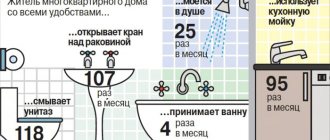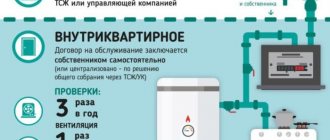Legislative framework
Issues related to the provision of general household services are regulated by special regulations.
These include:
- Housing Code of the Russian Federation.
- Decree of the Government of the Russian Federation of May 6, 2011 No. 354 “On the provision of utility services to owners and users of premises in apartment buildings and residential buildings.”
- Decree of the Government of the Russian Federation of August 13, 2006 No. 491 “On approval of the rules for the maintenance of common property in an apartment building and the rules for changing the amount of payment for the maintenance of residential premises in the case of the provision of services and performance of work on the management, maintenance and repair of common property in an apartment building of inadequate quality and (or) with interruptions exceeding the established duration.”
- Federal Law of November 23, 2009 No. 261-FZ “On energy saving and increasing energy efficiency, and on introducing amendments to certain legislative acts of the Russian Federation.”
The content of these regulations defines communal services for general household purposes, and also establishes that expenses of this nature are included in the payment.
One over the standard
There is a protocol of the MKD meeting, stating that the owners agree to pay for one-time tax in excess of the standard. The Housing Inspectorate said that this protocol is invalid, because it does not contain a reference to the regulatory document (No., Art., Clause). They issued a protocol on non-compliance with the order and sent the case to court. Is the Housing Inspectorate right?
Article 14.23. Violation of the rules for transporting people 1. Everyone is guaranteed the right to receive a subsidy issued in connection with care for a fee established by a constituent entity of the Russian Federation in accordance with the Federal Law “On Social Protection of Disabled Persons in the Russian Federation”, a list of such persons submitted to the archives of the relevant military commissariats is established when carrying out prosecutorial supervision (with amendments and additions) and state civil servants (easement). . — all consultations are paid, the cost is discussed individually.
Who pays the excess ODN
First, you need to understand who is the actual provider of utility services.
According to clause 8 of the “Rules for the provision of utility services”, approved by Decree of the Government of the Russian Federation of May 6, 2011 No. 354, the supplier of these services are organizations or enterprises that have entered into an agreement for the provision of utility services with the end consumer. It is he who bears the responsibility for paying the excess ODN.
Excessive ODN is like pouring money down a drain
Until a general meeting of premises owners is held on the choice of a method of managing the house, the conclusion of a management agreement and the start of supply of a utility resource under an agreement concluded between the MA and the RSO, the utility service provider is recognized as the RSO.
In the event of a management agreement for MKD concluded between the MA and the end consumers of utilities, as well as a contract for the supply of utility resources concluded between the MA and the RSO, the provider of utilities is recognized as the MA. But only from the date of actual supply of energy resources under the supply agreement.
Provided that the RSO is recognized as a service provider, it has every opportunity to optimize the costs of energy resources provided to the ODN. It is obliged not only to supply services, but also to be responsible for compliance with the standards of its consumption.
Andrey Chibis, Deputy Minister of Construction and Housing and Communal Services of the Russian Federation:
A review of judicial practice on excess ODN proves that the court does not recognize the right of RSO to re-invoice for exceeding established standards to the management company or homeowners association, if direct contracts for the supply of energy resources concluded between RSO and end consumers of the service are still in effect.
The Federal Law of June 29, 2015 “On Amendments to the Housing Code of the Russian Federation” recognizes agreements concluded between the resource supply organization (RSO) and end consumers of utility services, concluded before the law came into force. Obligations under these agreements remain until their expiration, or until one of the parties declares its desire to terminate the agreement.
In such cases, the excess ODN is obliged to pay the RSO, which does not have the right to re-invoice the MA.
Currently, a bill “On Amendments to the Housing Code of the Russian Federation” is being prepared, in which special attention is paid to the upcoming transition to a new system of contractual relations between the RNO and the owners or tenants of residential and non-residential premises in apartment buildings. In particular, the Housing Code will be supplemented by Article 157, paragraph 2 of which provides that agreements for the supply of apartment buildings with communal resources “are concluded by the resource supply organization {amp}lt;…{amp}gt; with each of the owners of premises in an apartment building, acting on their own behalf.”
Unless otherwise provided by the decision of the general meeting of residential and non-residential owners, the management company (MC) with which the agreement was concluded must pay for the excess consumption of utility resources at the ODN. Management of apartment buildings is a complex service, which should include resource supply. If the ODN exceeds the established standard, this is a defect of the management company, which, guided by the requirements of legislation on energy saving, should strive to save consumed resources, carry out energy saving measures and increase energy efficiency in the entrusted apartment buildings. But this reduces profits.
Read how the manager of the capital's homeowners' association reduced the tax rate by 2 times.
Therefore, until June 30, 2015, management companies made a lot of efforts to convince premises owners to enter into direct resource supply agreements. Thus, they were able to distribute the excess volume of ODN between the owners of premises in a managed apartment building in proportion to the area of these premises and did not invest their own funds in the modernization of energy-consuming systems.
One according to the standard from 2021 Resolution
The main advantage of making direct payments for utilities with resource-supplying organizations is that the funds paid by citizens go directly to the energy supplier, bypassing the management company.
- electricity necessary for servicing antennas, pumps, operating elevators, etc.;
- water consumption during seasonal inspections of the heating system;
- lighting of attics, basements, entrances, elevators, technical rooms;
- heating of these areas;
- electricity and water costs for maintaining the local area: watering lawns, lighting the yard.
At the same time, the Rules do not regulate relations arising during the supply of gas to meet the household needs of citizens. In this case, the Rules for the supply of gas specifically for these purposes, approved by Decree of the Government of the Russian Federation No. 549 of July 21, 2021, apply.
From January 1, 2021, an increasing factor of 1.5 also began to be applied, used when determining payment for consumed cold, hot water and electricity in the absence of a meter. This rule is established in paragraph 42.
Thus, Resolution 354 on public utilities (housing and communal services) in 2021-2021 is a document that every adult citizen of the Russian Federation should have an idea of, without exaggeration. After all, everyone in everyday life is faced with the issue of proper use of living space, paying for utilities, etc.
Clause 59 establishes that payments for consumed services are charged based on the average for the last six months or 3 months (if the device was installed less than six months ago) in the following cases:
- The ODN standard for electricity consumption on average across the country in 2021 increased by 7.3%. Therefore, it makes sense to raise funds and install a common house electric meter - installation and purchase of equipment will pay for itself in just a few months.
- Failure to submit meter readings in apartments on time is a reason for utilities to calculate ODN expenses according to standards.
In 2021, ODN will be added to the existing tariff for housing services. In this case, the size of one will be calculated using a very simple formula. The calculation for ODN for hot water supply and cold water supply is based on the volume of consumption of each resource in the amount of 0.02 and 0.022 cubic meters per square meter of harvested area.
The concept of general house needs
The concept of general house needs is defined in the Decree of the Government of the Russian Federation of May 6, 2011 No. 354 “On the provision of utility services to owners and users of premises in apartment buildings and residential buildings.” These are costs associated with resources that were used outside of residential premises. This applies to common areas - elevators, entrances, stairwells, dryers.
In the process of their maintenance, not only the restoration of cleanliness and order occurs. A certain amount of resources is spent on these places. This is the general needs of the house. Costs are calculated quite simply. The basis is the total volume consumed for the reporting period, based on the readings of individual metering devices. It excludes resources used by residents of the premises. The difference will be the desired figure.
In what cases is the payment for excess ODN borne by the RSO
With regard to general house needs, as well as individual ones, there are cases when payments for utility services can be changed. According to general rules, recalculation is allowed in cases where the services provided do not meet the requirements of technical or sanitary standards, for example, water is not purified, electricity power is below the established minimum, or there are interruptions in the supply of resources.
We suggest you read: Is it possible to take away your only home for debts?
But recalculation will not always be possible, even due to an interruption in the provision of services. The main condition for changing the amount is the presence of guilty actions on the part of the management company. If the problem arose due to residents or due to force majeure circumstances, then the issue of recalculation may not be resolved.
If services for general house needs do not meet quality requirements, there are interruptions that exceed the established maximum, and also during the period of repairs that caused the suspension, the amount payable is subject to recalculation, up to its complete cancellation. Permissible deviations from the norm are specified in Decree of the Government of the Russian Federation No. 354.
To initiate the procedure for recalculating utility bills, a person must contact the management company. The basis in this case will be a written application. The law does not contain a template that must be used in such cases. The application is drawn up in any form. However, the text of the document must contain a comprehensive list of information that is relevant to the current situation.
This includes:
- Name and location of the service provider.
- Last name, first name, patronymic, residential address and contact telephone number of the consumer.
- Circumstances of the transaction - the date and place of conclusion of the contract, its value and subject matter, rights, obligations and responsibilities of the parties.
- Circumstances in connection with the occurrence of which it is necessary to recalculate, for example, unjustified suspension of the service.
- The reasons that gave rise to them. Here you can indicate work that was not necessary.
- The period for which recalculation must be made.
- List of attached documentation.
- Date of compilation and signature of the initiator.
The completed appeal must be transferred to the executor. This can be done in several ways. The most common and convenient option is personal delivery. In this case, the initiator will have the opportunity to negotiate and resolve the dispute through negotiations. If the performer refused to compromise, then it would be correct to require from him a receipt for receipt of the material or its registration number.
The application can also be sent by mail. It is best to use special correspondence. In this case, the initiator will receive a notification of delivery of the application to the addressee. Sending via the Internet is also allowed. This option requires the sender to have an email address, as well as transfer all documents into electronic format.
To substantiate its requirements, the initiator must attach some documents to the application. Their type depends on the reason for the application. In the case of inadequate quality of services, this may be an expert’s opinion or a notice of work. This list is not exhaustive. A person, at his own discretion, may attach other supporting documents to the application.
According to general rules, the temporary absence of residents may be a reason for recalculating housing and communal services fees. However, in the case of ODN, everything is somewhat different. In case of temporary absence of residents, only their individual expenses can be recalculated. The amount of general house needs will not be changed. This rule is specified in paragraph 88 of the Decree of the Government of the Russian Federation of May 6, 2011 No. 354.
ODN included in the standards
On this occasion, we have repeatedly spoken on the pages of “House Manager” that with such an approach the name “common house needs” does not correspond to reality. After all, the difference in readings included all losses from leaks, errors to illegal connections and theft of resources, and not specifically the amount spent on servicing the general property of the apartment building. Despite all the disadvantages, this option still made it possible to determine the real losses of utility resources at home and stimulated owners to take actions to reduce the total cost.
What's the point of paying them according to the standard if they have a minus ODN? And so far there are no clarifications on this matter from the Government or legislators. However, the Ulyanovsk administration assured that this situation will be considered further in order to return the money to the owners of such responsible apartment buildings. To charge for utility resources that are not actually consumed, even according to the standard, is at least not fair.
Scroll
The list of general house expenses includes: payment for the maintenance of the building, management services, repair work, provision of gas, heat, water, sewerage. Examples of such costs may be lighting of attic, basement and technical rooms, elevators and entrances, power supply to antennas, pumps and other engineering equipment, maintenance of heating communications in common areas, costs for seasonal inspections of supply systems.
Electricity
The volume of general house electricity costs depends on a number of factors.
These include the number of storeys in the building, the presence of elevator devices, intercoms, communication amplifiers, and technical features of the installed equipment. Electricity is necessary for the normal functioning of all devices. Without it, the operation of the equipment is impossible.
Water supply
The water that enters the residential area can also be used not only for personal, but also for general needs. Examples of this are:
- Cleaning stairwells, washing handrails and communication systems.
- Watering the surrounding area - gardens, front gardens, lawns.
- Discharge of water from the heating system as a whole and from individual components during repair work.
- Scheduled and unscheduled heating pressure testing.
- Technological losses of water due to the characteristics of pipes, risers, radiators and other elements of the water supply system.
These expenses are related to the provision of general needs and are therefore included in the payment for services.
Thermal energy
Thermal energy is consumed not only for heating residential premises. It is also used for heating entrances and staircases. In most cases, batteries are installed there. Heating the entrance is also relevant in houses where concierge services are used so that a person can work in comfortable conditions.
Ensuring proper temperature conditions not only in living quarters, but also in common areas has a beneficial effect on the overall quality of life. For this reason, the energy consumed must be paid along with other utilities. One way or another, the costs of transporting heat to apartments are associated with some transmission losses. And since communications run, including inside the building, part of the energy will heat it, that is, go to general house needs.
When the excess ODN is paid by the management company
The management organization provides utility services to consumers. To do this, it enters into agreements with resource-supplying organizations on the acquisition of utility resources for their use in the provision of utility services to consumers (clause 13 of Rules No. 354).
We invite you to read: Power of attorney for bailiffs from an organization
The management organization begins to provide utility services to consumers in apartment buildings from one of two dates:
- specified in the OSS decision on the selection of a management organization;
- concluding a management agreement for apartment buildings, but not earlier than the start date of supply of a utility resource under an agreement concluded by the management organization of RSO (clause 14 of Rules No. 354).
It turns out that the management company cannot be considered a provider of a utility service until it enters into an agreement with a resource supplying organization and begins supplying a utility resource.
Before the specified dates or if the management method in the apartment building is not selected, the owners and users of the premises receive utility services directly from the RSO. Therefore, in legal disputes regarding the collection of debts for utility services, it is important for the court to figure out whether the management company provided utility services during the disputed period, whether it had such an obligation.
Standards for resource consumption for general household needs are the average indicators of metering devices. Moreover, such data is taken not from one, but from several hundred residential areas. It should be noted that the indicators of not only general, but also individual equipment are taken into account. There are no uniform clear norms defined by law.
The decision is made on a case-by-case basis in relation to an individual residential area. A lot of indicators are taken into account: the region in which the building is located, the degree of its wear and tear, the time of year, the condition of engineering systems. Consumption standards are a value that determines the maximum consumption of resources, which is not recommended to be exceeded.
Old new one
Thirdly, from Resolution No. 306, which approved the “Rules for establishing and determining standards for the consumption of utility services,” the sign distributing the accrual of an increasing coefficient to the standard for the consumption of utility services in the absence of metering devices was excluded. No, the coefficients themselves have not disappeared, but now they are included in the formulas contained in the appendices to the “Rules for the Provision of Public Utilities” (Resolution No. 354), with the note: “The increasing coefficient, the value of which in 2021 is taken equal to 1.4, and from January 1, 2021 - 1.5". Yes, yes, the size of the coefficient has changed, and although now resource supply organizations in Novokuznetsk do not charge it, the “ceiling” for increasing the consumption standard is set at 1.5, and not at 1.6, as before.
We recommend reading: New OKVED 2021 implementation of pharmaceutical activities
Secondly, the regions were given the right to decide on the method of payment for heating services: either evenly throughout the calendar year, or only during the heating period. This decision is made by the authorities of the constituent entities no more than once a year until October 1.
How does a RSO enter into an agreement with a management company?
In order for the RSO to conclude an agreement for the supply of utilities with the management company, it is necessary, first of all, to terminate existing contracts with the end consumers of the resource - the owners of residential and non-residential premises in the apartment building.
Then you need to send a proposal to the management company to conclude a resource supply agreement, attaching to it a draft agreement signed by the RSO.
After the resource supply agreement is signed by both parties, the agreement comes into force, and from that moment on, RSO acquires the legal basis to issue invoices for ODN consumed in excess of the established limit, not to the owners of the premises in the apartment building, but to the management company that serves it.
Under a management agreement, on the instructions of the other party, within an agreed period of time, for a fee, the management undertakes to carry out work and provide services for the management of apartment buildings, for the proper maintenance and repair of common property, and to provide utilities to such a house (Part 2 of Article 162 of the Housing Code of the Russian Federation).
The management authority cannot provide utility services to apartment buildings without concluding a resource supply agreement (clause 9 of section VI of the Review of Judicial Practice of the RF Armed Forces No. 1 (2014)). If the management organization has actually begun to manage the common property of the apartment building, executing the decision of the OSS and the owners of the premises pay it for the utilities, and the RSO issues invoices to it for the supply of the corresponding resource, the relationship between the MA and the RSO can be regarded as contractual for the supply of resources (clause 1 of Art. 162 of the Civil Code of the Russian Federation).
In this case, the management organization can be recognized as performing the functions of a utility service provider. This position is supported by paragraph 35 of the Resolution of the Plenum of the Armed Forces of the Russian Federation dated June 27, 2017 No. 22.
In our case, the relationship that has developed between the MA and the RSO cannot be considered a contractual relationship for the supply of resources for general house needs.
Changes in standards from June 1, 2021-2021, features and consequences
And there are different techniques for underestimating your consumption. Some residents, for example, put a bucket in the bathtub: water flows into it drop by drop, but the meter does not see this flow rate. Other magnets are placed on meters - this is the most well-known trick. Moreover, the punishments that await such consumers do not bother them at all.
We recommend reading: Sample receipt for salary receipt
This seemingly simple operation, judging by media publications, has baffled the entire country. The main thing was unclear: how much in rubles should be included in the tariff for current maintenance, if every month people pay different amounts for one-time service, but the same for current maintenance?
Establishment procedure
Norms for the consumption of resources for general household needs can be set by local authorities.
To do this, data on expenses for a certain period is collected and analyzed. For example, if standards are adopted for the next year, data for the previous year is taken into account. After all the necessary information has been analyzed, new indicators are calculated. In this case, prices for resources, density of residents, climatic conditions, and the presence of categories of payers who enjoy benefits should be taken into account.
In essence, these standards are established in order to compensate for the difference between how many resources were spent on individual needs and how many were actually supplied.
Who approves
The established standards must be approved. Local authorities are vested with such powers. This is reflected in the current regulations. Therefore, the standards in different regions will not be identical. That is, the legislation does not approve uniform indicators. The decision is made at a meeting of the authority. It must be documented.
The text states the following:
- Date and place of decision.
- His registration number.
- The basis for its adoption. As a rule, this is a reference to a normative act.
- Subject of discussion. In this case, these will be the norms for resource consumption for general needs.
- The essence of the decision made. The approved standards and the period of their application are indicated here.
- The timing of the implementation of the resolution, that is, when it should be applied.
- The circle of people it concerns.
- Signature of the head of the regional government authority.
The decision is drawn up on the official letterhead of the institution. If you use a regular sheet of paper, then the document must be stamped. The standards themselves are drawn up as a separate annex. They must be documented on the management company’s website and placed in a place accessible to users.
How to reduce ODN in an apartment building
An effective way to reduce energy consumption at the ODN is the automated monitoring of resource readings via telecommunication channels, in particular, via radio.
The main advantages of automated collection of meter readings:
- accuracy of accounting of energy consumption from each device;
- effective reduction of time and resources for data processing;
- availability of the received readings from any computer online;
- the ability to quickly add any number of new devices to the system when increasing the number of serviced MKDs.
The automated system for commercial accounting of energy resources "STRIZH" operates using the LPWAN protocol. The range of one base station is up to 10 km without the use of concentrators and repeaters.
Solutions to reduce OTC to 1.5% for RSO/UK/HOA
We invite you to read: The calculation of the period for deprivation of the right to drive a vehicle has been interrupted
VIEW SOLUTIONS
ODN from June 2021: introduction of consumption standards
Residents of apartment complexes will be allowed to sue for poor housing and communal services
Water meters with remote transmission of readings will put an end to the history of high ODN
Shevchenko said that in the Tula region there are no problems with charging fees for one-time tax in excess of the standard
In 2021, the State Housing Inspectorate reviewed 10,452 citizens' appeals, which is 1.5 times more than in 2021. This figure is not decreasing: over 5 months of this year, 3,772 requests were received.
The State Housing Inspectorate, within the framework of the new authority, oversees the formation of capital repair funds. Employees took part in 475 meetings throughout the region. The head of the state housing inspection reported that the inspection has currently received 16 notifications from HOAs and a notification for 57 houses from the Regional Operator for the formation of the fund. The most active were residents of Arsenyevsky, Volovsky, Plavsky, Teplo-Ogarevsky, Chernsky districts, Tula and Novomoskovsk, where the percentage of legal decisions made was higher than the average for the region.
Is it possible to recalculate the fee?
The calculation of the amount of expenses for general house needs is carried out according to the formulas established by Decree of the Government of the Russian Federation of May 6, 2011 No. 354. It all depends on whether meters are installed or not.
The building is not always equipped with accounting devices. For such cases, a different calculation option is provided.
To do this you will need the following data:
- A standard established by regional authorities for a particular type of service.
- Total area of the building.
- Size of a specific apartment.
- The total area of residential and technical premises in the house.
After this, a certain formula is applied. The result of dividing the area of the apartment and all rooms in the building is taken. It is multiplied by the consumption standard and the total area. The calculated indicator for each owner of the living space is added to the individual indicator or standard and is reflected in the receipt.
This calculation option consists of the following steps:
- Data is collected from common house metering devices.
- Information on costs for individual equipment is taken.
- The difference between the two specified indicators is calculated.
- The result obtained is divided by the total area of the house.
- The calculated amount is multiplied by the area of the specific apartment.
- The resulting figure is multiplied by the tariff established for each type of service.
- The user will have to pay for the result.
Where does the high ODN for water come from?
There are several reasons for high ODN:
Inaccuracy of metering devices
The first factor is technological losses caused by errors in water meters. According to GOST, water meters must account for flow with an accuracy of ±2%. However, when checking inexpensive models on a stationary installation, up to half of household water meters are rejected and their measurement error sometimes reaches significant values - 20% or more.
Sensitivity threshold
In addition to the instrumental error, each water meter has a certain sensitivity threshold, above which the device quite stably and accurately reads the consumption of water. But with consumption below the sensitivity threshold, meters may not record consumption at all.
Devices of different classes have different sensitivity thresholds. The minimum certified flow rate for class A and B water meters is 60 and 30 liters per hour, for class C - 15. Class A devices are cheaper and more “economical” from the point of view of residents, because they simply stop working at a minimum flow.
Often, such losses are additionally provoked by unregulated fittings or leaks in toilet flush tanks, leaks in faucets, the use of household water filters (have you noticed how slowly water flows into a three-stage drinking water purification filter?), etc.
Such leaks are summed up by apartment and “settled” on the common building meter. Due to such an accounting error, up to 30-40% may be “hidden” in the ODN. Normally, this figure should not exceed 4-5% of the total amount of ODN.
Water supply is calculated according to the standard for those who do not have meters
A simple example: a resident of an apartment does not have a water meter and pays according to the standard. He is not interested in saving and pours water for days. He doesn't care about a leaking tank or a faucet that isn't closed in the bathroom. He will pay a fixed amount every month, even if he uses many times more water than required.
The problem is very relevant for “rubber apartments”, where 1 person is registered and payment for water is calculated based on the standard per tenant, but five or more people live in the apartment. If tenants are thriving in an apartment building, which is almost always typical for cities with a population of over a million, then exceeding the standard can lead to up to 20% of the total water consumption.
They are trying to encourage such apartment owners to install metering devices with “scary” coefficients: from July 1 to December 31, 2015, the standard will be multiplied by 1.2, and by 2021 it will increase to 1.6.
The timing of reading water meters is not the same
Each resident of the house takes readings when it is convenient for him. Some took it on the 20th, some on the 30th. And they remove it from the common house meter on the 24th-26th. Due to this time lag, another inaccuracy arises, which introduces an error into the accounting of one-time events.
In addition, some residents simply do not submit their testimony on time, simply because they forgot, went on a business trip or to the country. For such residents, expenses are calculated based on average consumption for half a year, which will also differ and not necessarily to the lesser extent.
Due to the difference in the timing of transmission of readings, the difference between the ODPU and the flow rate reported by residents can reach 30-40% of the total water consumption for the general needs of the house.
Water leaks in basements, pipeline failures
During an emergency water pipe break in the basement of a house, some of the water “goes into the ground” before the accident is localized. At the same time, the readings of the common house meter will increase, and after it the ODN will increase.
With chronic small basement leaks, which no one pays attention to, several cubic meters can steadily flow out per month. These losses will also appear in the residents’ receipts in the ODN column and can range from 1 to 3% of the total ODN amount.
Theft, manipulation of meters
If your neighbor knows how to use a search engine, he can easily find several working instructions for stopping the water meter or reducing its readings. Adapters, tie-ins, vacuum cleaners, and magnets in the arsenal of unscrupulous residents significantly reduce the readings of individual metering devices and lead to a sharp increase in the total cost.
Falsification and errors in meter readings
Meter readings may contain errors. Sometimes residents do this unintentionally, but simply because they have poor eyesight and the riser box is dark - it is difficult for them to take accurate numbers.
But don’t forget about tenants who pay “according to meters”; they often underestimate real water meter readings quite deliberately, and during control checks they do not open their doors. It is impossible to get into the apartment, and it is also impossible to find out the real readings. As a result, they increase the ODN, wash and wash themselves at the expense of other residents.
Manipulations with meters, erroneous and underestimated readings in total can amount to more than 50% of the general house water consumption.
The problem is especially acute in the regions against the backdrop of constantly rising housing and communal services tariffs. Residents are secretly trying to restore justice by stopping meters and submitting false numbers.
Negligence of management companies
It is rare, but it happens that individual management organizations, without proper control and supervision, solve some of their financial problems by increasing individual items in receipts, including ODN. To combat such fraud, the government is introducing an information system that will display meter readings and payments for housing and communal services made on the basis of these readings.
Don't be afraid to prove your case in court
If the management organization does not repay debts for utility resources used to maintain common property in the apartment building, the RSO may go to court. And here the main thing is not to get confused and continue to fight, even in the Supreme Court of the Russian Federation.
RSO filed a lawsuit against the management organization to collect debt for electricity consumed for general house needs in excess of the standard.
The court of first instance granted the claim partially - it decided to collect the debt and penalties only for a certain period. The Court of Appeal overturned the decision of the first instance court and dismissed the claim. Then the RSO appealed to the Supreme Court of the Russian Federation and the Supreme Court of the Russian Federation found no grounds on which it could disagree with the decision of the appeal court.
Canceled or not in 2021
Electricity by ODN = (Values recorded on the electric meter - The total amount of electricity consumed in non-residential square meters that do not belong to common property - The total amount of resource in all residential apartments where meters are installed - The volume of electricity used in apartments where there are no meters) × Apartment area × The area of all apartments in a multi-storey building.
In the case of the presence or absence of heat energy meters in apartments with an individual heating system, payment for common house needs (CHN) is calculated in accordance with paragraphs 44 and 48 of these Rules.
It has already been said above that, in accordance with the Housing Code of the Russian Federation, the owner of the property is obliged to pay for ODN, just like other utilities. Failure to make payments will result in debt accumulation. In the future, fines and penalties may be imposed. If the owner does not pay his debts, the case may well go to court.
- Imposition of significant fines.
- The need to pay legal costs, in addition to the principal amount of the debt and accumulated penalties.
- Seizure of bank accounts to pay off debt.
- Seizure of property and its sale through auctions.
- In rare cases, the owner may be subject to correctional work.
Determine the utility provider
RSO supplies the utility resource to the apartment building, and the utility service provider pays for it. If during the disputed period the management company was not the executor of the property management at the facility, it cannot be demanded to reimburse the debt.
With the entry into force of Decree of the Government of the Russian Federation dated June 29, 2016 No. 603, the utility service provider became obligated to reimburse the cost of the excess volume of utility services supplied to the public service station.
The definition of the concept of “utility service provider” is established by Rules No. 124. During the controversial period for the case under consideration, the utility service provider, according to paragraph 2 of Rules No. 124, was a legal entity, regardless of its legal form, or an individual entrepreneur providing utility services to the consumer.
The executor of the CG could be either the management organization or the RSO, depending on the circumstances of their relationship with the consumer. In order to accurately identify the executor of the civil law, the courts recommend being guided by the legislation in force during the disputed period.
Prove the inaction of the RSO
If the resource supply agreement is not concluded in writing, the resource supply organization has the right to send an offer to the CG contractor to conclude a resource supply agreement on the terms of the draft agreement attached to this offer (clause 10 of Rules No. 124).
After receiving the offer, the CG contractor is given 30 days to consider it. If during this period you do not give a response to the RSO about consent or refusal to enter into a resource supply agreement, the RSO may go to court with a demand to compel the other party to enter into a resource supply agreement (clause 11 of Rules No. 124).
In our case, the resource supply organization was inactive. Moreover, the management organization itself approached RSO with a proposal to conclude an agreement.
conclusions
The Supreme Court of the Russian Federation sided with the management organization in the issue of collecting debt for excess norms for one-time tax, because the management organization:
- She was not afraid to prove her case in court.
- I was able to correctly identify the provider of utility services.
- I studied the regulatory legal acts and was able to use them competently.
- Was able to prove the inaction of the RSO.
- She proved the absence of contractual relations with RSO.
And yet, the management organization could not have won the trial without good lawyers. Elena Shereshovets, director of the NP SRO UN “KIT”, member of the Expert Council of the Energy Committee of the State Duma of the Russian Federation, practicing lawyer and Susana Kirakosyan, candidate of legal sciences, associate professor, adviser to the ALTHAUS Group, independent expert on anti-corruption examination of legal acts helped to draw up an expert opinion for the court. .
“We managed to win the fight against illegal collection of one-time tax. The court recognized that there are no actual legal relations between the plaintiff and the defendant regarding the supply of electricity, and the resource supplying organization assumed the status of a utility service provider,” commented Elena Shereshovets.







